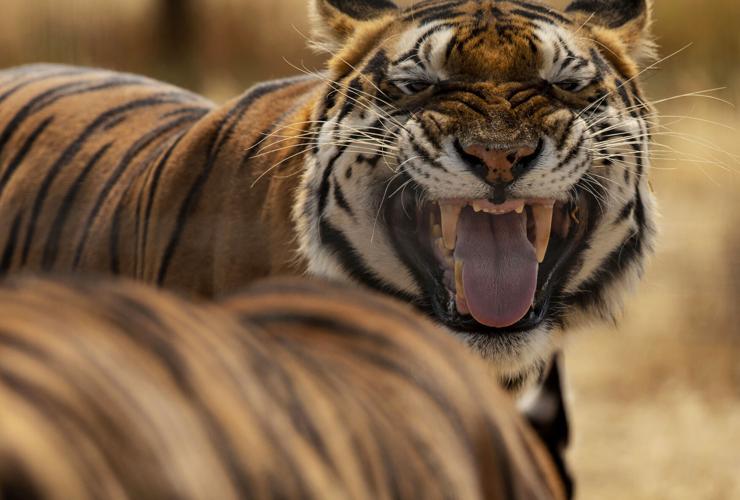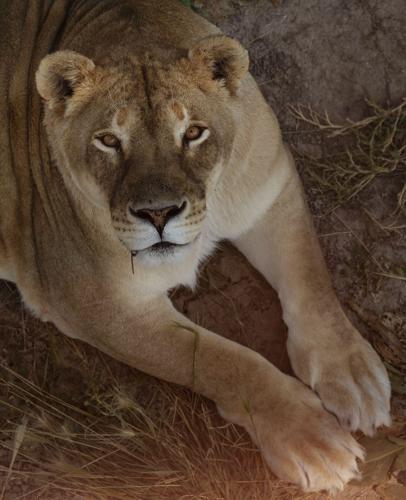In 1980, 19-year-old Pat Craig got a call from a North Carolina zoo in response to one of the many letters he sent around the country. He had offered himself and his family’s Boulder County farm as a safe harbor for “surplus” animals bound for euthanasia.
The Wild Animal Sanctuary in Keenesburg, Colo., is a nonprofit organization dedicated to educating people about the captive wildlife crisis in America. The 789 acre-sanctuary is home to 400-plus lions, tigers, bears and other animals. (Video by Skyler Ballard)
A baby jaguar needed a home. Problem was Craig needed to fly back to Colorado with it.
“What do you have?” he recalled an airline attendant asking, during an interview with The Gazette last year.
“Crap,” he remembered thinking.
“I told her it’s just a kitten. I opened up my bag and it’s spotted with round ears instead of pointed. ... She goes, ‘OK.’”
He named the jaguar Freckles. So began “a 40-year journey to combat the growing crisis of exotic animal captivity, abuse, and trafficking — one rescue at a time,” reads a new book about the Wild Animal Sanctuary.
Now instead of flying, Craig and his staff drive air-conditioned trailers around the country at the request of law officials and activists. The 789 acres on the Keenesburg prairie northeast of Denver have become renowned, housing hundreds of lions, tigers, bears and others like Freckles that never got to know their native habitats.
The new book, “Forever Wild, Forever Home,” is billed as an unprecedented look at how the nonprofit sanctuary came to be and how it continues today. It’s authored by Melanie and Mark Shellenbarger, among the organization’s legion of volunteers.
The Shellenbargers considered themselves “changed forever” three years ago when they laid eyes on the sanctuary’s “enormous habitats” — enclosures ranging between 5 to 20 acres — and learned of the captive wildlife crisis.
“Our hope is this book will offer an accessible but deeper look into the nobility of the animals that call the Sanctuary home and the heroic labors of those who care for them,” they said in a statement.
A news release called the book a “behind-the-scenes look at what it is really like to rescue, rehabilitate and provide lifelong care for these magnificent survivors.”
Freckles lived to be 24, long enough to see Craig’s move from the family farm to these Weld County plains in 2002. He established the 501©(3) around that time, realizing he needed a significant workforce and financial support to carry on his mission. “As one person, you can only save so many animals,” he previously told The Gazette.
The Wild Animal Sanctuary has operated on a $23 million annual budget, fueled by admission fees from about 150,000 visitors every year and donations from a massive fanbase.
More attention came last year, when it became known the sanctuary took in troubled tigers bred by the zany zookeeper known as Joe Exotic, the imprisoned “Tiger King” of the hit Netflix documentary series. A captivated audience watched as end credits addressed the state of animal cruelty in America.
Education is the stated goal of “Forever Wild, Forever Home.”
The majority of proceeds from book sales are said to be going back to the nonprofit.










(0) comments
Welcome to the discussion.
Log In
Keep it Clean. Please avoid obscene, vulgar, lewd, racist or sexually-oriented language.
PLEASE TURN OFF YOUR CAPS LOCK.
Don't Threaten. Threats of harming another person will not be tolerated.
Be Truthful. Don't knowingly lie about anyone or anything.
Be Nice. No racism, sexism or any sort of -ism that is degrading to another person.
Be Proactive. Use the 'Report' link on each comment to let us know of abusive posts.
Share with Us. We'd love to hear eyewitness accounts, the history behind an article.